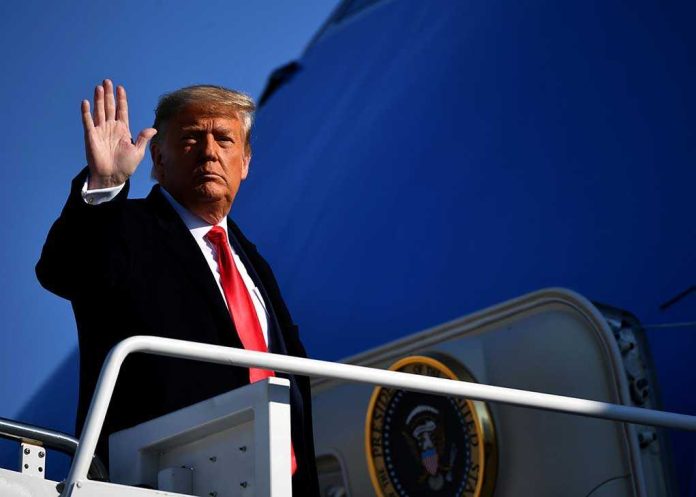
One presidential signature has turned a convicted lawmaker’s seven-year prison sentence into a political firestorm, leaving the nation to debate whether justice is a privilege or a principle.
Story Snapshot
- Donald Trump commuted the sentence of former Rep. George Santos, convicted of fraud and identity theft.
- The decision reignites debates over political favoritism and the boundaries of executive power.
- Critics and supporters alike question what this means for the rule of law and future pardons.
- The saga reflects deeper questions about accountability and privilege in American governance.
Trump’s Commutation: A High-Stakes Act with Ripple Effects
President Donald Trump’s commutation of George Santos’s federal sentence has instantly transformed a legal consequence into a national controversy. Santos, once a rising star in Congress, became a symbol of political scandal after pleading guilty to fraud and identity theft. Facing more than seven years behind bars, he instead walks free, thanks to a stroke of executive authority. This move, while legal, has left many Americans asking if justice is equally applied or conveniently dispensed for political allies.
Legal scholars and political commentators are already dissecting the implications. On one hand, the president’s power to grant clemency is enshrined in the Constitution, intended as a check against judicial overreach or miscarriages of justice. On the other, the optics of commuting the sentence of a convicted lawmaker—especially one from the president’s own party—raise suspicions of favoritism and undermine public trust in the impartiality of the legal system. The clemency tool, when wielded for political convenience, risks eroding the principle that all citizens stand equal before the law.
Fraud, Identity Theft, and the Fall of George Santos
George Santos’s conviction sent shockwaves through the halls of Congress. Prosecutors detailed how Santos orchestrated schemes that defrauded donors, misrepresented his credentials, and stole identities for personal gain. His guilty plea marked a spectacular fall from grace, turning a promising political career into a cautionary tale. The severity of his crimes—once seen as warranting seven years of incarceration—was mitigated not by judicial review but by presidential intervention.
The commutation does not erase Santos’s guilt or expunge his conviction; it merely removes the punishment. For many, this distinction is cold comfort. The fact remains that a lawmaker entrusted with public office was found guilty of betraying that trust. Many Americans, particularly those who believe in strict accountability for public officials, see the commutation as a dangerous precedent. Some, however, argue that Santos was a victim of political prosecution, and that the president’s act was a necessary correction of judicial excess. The truth, as always, is tangled in competing narratives.
Executive Clemency: Privilege or Principle?
The president’s clemency power is as old as the republic itself, designed as a relief valve for a sometimes rigid justice system. But history shows that its use is often controversial, especially when the beneficiary is a political insider. Critics recall past pardons that stoked outrage—Ford’s pardon of Nixon, Clinton’s pardon of Marc Rich, and now Trump’s intervention for Santos. Each time, the public wonders: Is the president upholding justice, or shielding cronies?
Donald Trump has pardoned George Santos, here’s RUNNING INTO GEORGE SANTOS pic.twitter.com/3wsmXN3kFN
— Matt Friend (@themattfriend) October 17, 2025
Supporters of the commutation point to the president’s absolute authority in this realm, arguing that the executive branch must have the flexibility to remedy judicial errors or excessive penalties. Yet the public’s patience for perceived political self-dealing is thin. American conservative values emphasize equal justice, accountability, and the rule of law. When clemency appears to violate these tenets, it threatens to erode the very foundation of trust that makes ordered liberty possible.
Public Outcry and the Political Costs
Reaction to the commutation has been swift and polarized. Opponents decry the move as a slap in the face to the justice system and those who believe in consequences for public corruption. Allies of the president, meanwhile, cast the action as a bold stand against what they see as politically motivated prosecutions. The battle lines are drawn not just around the facts of the Santos case, but around the future of executive power and the expectations Americans have for their leaders.
This story is far from over. As Santos returns to public life—his conviction intact but his sentence erased—the debate will rage on. Will this commutation embolden future presidents to intervene for their allies? Or will public backlash set new informal limits on the use of this awesome power? The answers will shape the contours of accountability in American government for years to come.



